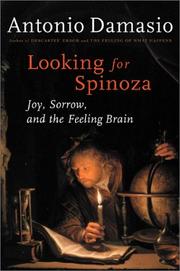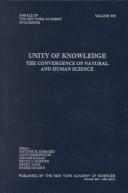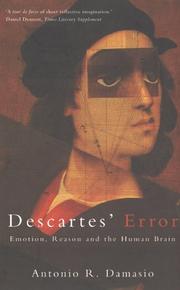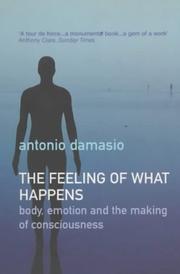| Listing 1 - 10 of 48 | << page >> |
Sort by
|
Book
ISBN: 9789028420045 Year: 2009 Publisher: Amsterdam Wereldbibliotheek
Abstract | Keywords | Export | Availability | Bookmark
 Loading...
Loading...Choose an application
- Reference Manager
- EndNote
- RefWorks (Direct export to RefWorks)
In dit ambitieuze en vlot leesbare boek schetst Antonio R. Damasio zijn briljante en toetsbare hypothesen over de mechanismen van het menselijk bewustzijn en benadrukt hij het grote belang van natuurlijke selectie en evolutie voor zijn theorie van de geest. Neuropsychologische experimenten en klinische ervaringen met patiënten komen hierbij ruimschoots aan bod: ze verduidelijken de manier waarop ons brein functioneert en leiden de lezer naar het inzicht dat bewustzijn en emotie op dezelfde biologische basis steunen. Damasio's verrassende combinatie van poëtische intuïtie en wetenschappelijk hersenonderzoek dient een gedurfde doelstelling: het ophelderen van de geest, die niet alleen op mysterieuze wijze neutrale patronen in mentale beelden omzet, maar die ons ook het unieke gevoel geeft een zelf te zijn dat zoekt naar de betekenis van de wereld en het leven. In dit boek behandelt Antonio R. Damasio zijn hypothese dat het menselijk bewustzijn en diens emotie op dezelfde biologische basis steunen. Hij wil de geest ophelderen, omdat die niet alleen neurale patronen omzet in mentale beelden, maar ook ons het unieke gevoel geeft een 'zelf' te zijn dat zoekt naar de betekenis van de wereld en het leven. Het boek is in vier delen opgedeeld. Na een inleiding volgt een deel over voelen en weten. Daarna een uiteenzetting van de biologische benadering van het weten en tot slot de verplichte kennis. Een behoorlijk wetenschappelijk en filosofisch beschreven boek, dat wel verhelderend kan zijn voor mensen die in studie of werk bezig zijn met emotie en gevoel, maar ook het visualiseren van gevoel en bewustworden ervan.
bewustzijn --- Neuropathology --- Affective and dynamic functions --- Bewustzijn --- Emoties --- Bewustzijn. --- Emoties.
Book
ISBN: 9028418482 Year: 2001 Publisher: Amsterdam Wereldbibliotheek
Abstract | Keywords | Export | Availability | Bookmark
 Loading...
Loading...Choose an application
- Reference Manager
- EndNote
- RefWorks (Direct export to RefWorks)
Neuropathology --- Affective and dynamic functions --- 616.8 --- 159.93 --- Neuropathologie --- Psychische functies

ISBN: 0151005575 Year: 2003 Publisher: Orlando, Fla Harcourt
Abstract | Keywords | Export | Availability | Bookmark
 Loading...
Loading...Choose an application
- Reference Manager
- EndNote
- RefWorks (Direct export to RefWorks)
Philosophical anthropology --- Animal psychology and neurophysiology --- Emotions. --- Neuropsychology. --- Emotions --- Neuropsychologie --- Spinoza, Benedictus de,
Book
ISBN: 0434007870 Year: 2003 Publisher: London Heinemann
Abstract | Keywords | Export | Availability | Bookmark
 Loading...
Loading...Choose an application
- Reference Manager
- EndNote
- RefWorks (Direct export to RefWorks)

ISBN: 1573313114 Year: 2001 Volume: 935 Publisher: New York New York Academy of Sciences
Abstract | Keywords | Export | Availability | Bookmark
 Loading...
Loading...Choose an application
- Reference Manager
- EndNote
- RefWorks (Direct export to RefWorks)
Cognitive neuroscience --- Knowledge, Theory of --- Science --- Social sciences --- Philosophy --- Congresses --- Knowledge [Theory of ]
Book
ISBN: 9780307378750 0307378756 Year: 2010 Publisher: New York : Pantheon books,
Abstract | Keywords | Export | Availability | Bookmark
 Loading...
Loading...Choose an application
- Reference Manager
- EndNote
- RefWorks (Direct export to RefWorks)
"From one of the most significant neuroscientists at work today, a pathbreaking investigation of a question that has confounded philosophers, psychologists, and neuroscientists for centuries: how is consciousness created?" "Antonio Damasio has spent the past thirty years studying and writing about how the brain operates, and his work has garnered acclaim for its singular melding of the scientific and the humanistic. In Self Comes to Mind, he goes against the long-standing idea that consciousness is somehow separate from the body, presenting compelling new scientific evidence that consciousness--what we think of as a mind with a self--is to begin with a biological process created by a living organism. Besides the three traditional perspectives used to study the mind (the introspective, the behavioral, and the neurological), Damasio introduces an evolutionary perspective that entails a radical change in the way the history of conscious minds is viewed and told. He also advances a radical hypothesis regarding the origins and varieties of feelings, which is central to his framework for the biological construction of consciousness: feelings are grounded in a near fusion of body and brain networks, and first emerge from the historically old and humble brain stem rather than from the modern cerebral cortex." "Damasio suggests that the brain's development of a human self becomes a challenge to nature's indifference and opens the way for the appearance of culture, a radical break in the course of evolution and the source of a new level of life regulation--sociocultural homeostasis. He leaves no doubt that the blueprint for the work-in-progress he calls sociocultural homeostasis is the genetically well-established basic homeostasis, the curator of value that has been present in simple life-forms for billions of years. Self Comes to Mind is a groundbreaking journey into the neurobiological foundations of mind and self."--BOOK JACKET.
Brain --- Consciousness. --- Developmental neurobiology. --- Consciousness --- Emotions --- Memory --- Theory of Mind --- Evolution. --- physiology. --- Physiology.

ISBN: 0333656563 Year: 1996 Publisher: London Papermac
Abstract | Keywords | Export | Availability | Bookmark
 Loading...
Loading...Choose an application
- Reference Manager
- EndNote
- RefWorks (Direct export to RefWorks)
316.77 --- Communicatiesociologie --- Psychoanalyse --- psychoanalytische theorie --- psychoanalytische theorie. --- 316.77 Communicatiesociologie --- Psychoanalytische theorie.
Book
ISBN: 9789028418295 Year: 2006 Publisher: Amsterdam Wereldbibliotheek
Abstract | Keywords | Export | Availability | Bookmark
 Loading...
Loading...Choose an application
- Reference Manager
- EndNote
- RefWorks (Direct export to RefWorks)
Sinds Descartes de wereld van het denken scheidde van die van de materie zijn wij er van overtuigd dat een analyse van de menselijke rationaliteit geen boodschap heeft aan kennis van het menselijk lichaam. Volgens Damasio, vooraanstaand hoogleraar neurologie, ten onrechte. Onderzoek van patiënten met een bepaald type hersenbeschadiging bracht hem tot de gedachte dat emoties een cruciale rol spelen bij allerlei rationele processen, en dat die emoties op hun beurt lichamelijk verankerd zijn. In dit boek werkt hij die gedachte uit tot een theorie van de menselijke geest, waarbij het lichaam in zijn wisselwerking met de omgeving centraal staat. Damasio schrijft fascinerend, voor een breed publiek, al bevat zijn boek voor een leek misschien wat veel neurobiologie. Hij geeft zijn lezer een blik in de werkplaats van de wetenschap, waar disciplines elkaar raken, waar grenzen worden verlegd, waar verbeeldingskracht en experiment hand in hand gaan. Bevat noten, literatuurlijst en index.
Physiology of nerves and sense organs --- Emoties. --- Neurologie. --- Rationalisme.
Book
ISBN: 9789028423787 Year: 2014 Publisher: Amsterdam Wereldbibliotheek
Abstract | Keywords | Export | Availability | Bookmark
 Loading...
Loading...Choose an application
- Reference Manager
- EndNote
- RefWorks (Direct export to RefWorks)
emotion --- Philosophical anthropology --- philosophical anthropology --- wijsgerige antropologie --- emoties --- De Spinoza, Benedictus

ISBN: 0099288761 Year: 2000 Publisher: London Vintage
Abstract | Keywords | Export | Availability | Bookmark
 Loading...
Loading...Choose an application
- Reference Manager
- EndNote
- RefWorks (Direct export to RefWorks)
| Listing 1 - 10 of 48 | << page >> |
Sort by
|

 Search
Search Feedback
Feedback About UniCat
About UniCat  Help
Help News
News